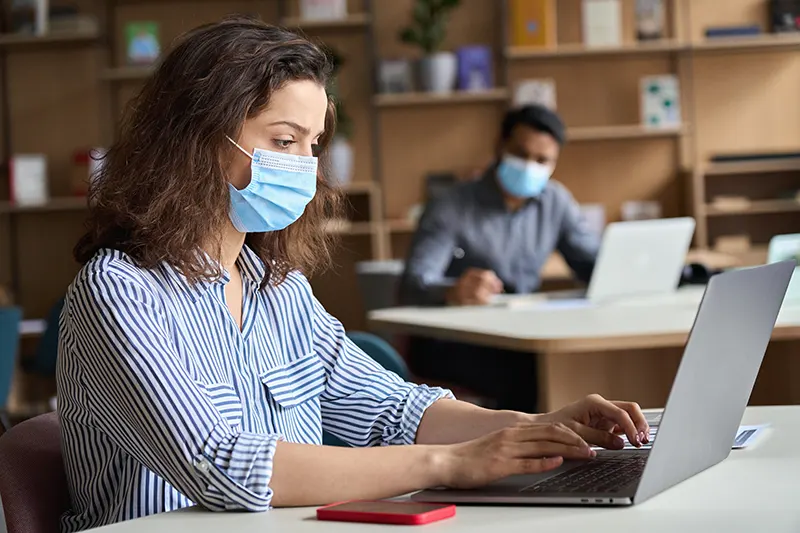Workers’ compensation is a type of insurance that provides medical benefits and wage replacement to employees who become injured or ill due to work-related activities. There are several ways that you can qualify for workers’ compensation, one of which is by being diagnosed with an occupational disease.
To help you fully understand occupational diseases and how they relate to workers’ compensation, we’ll explore what exactly an occupational disease is and how it can affect you as an employee. That way, you can be better prepared in the event that you develop a work-related illness.
What Exactly is an Occupational Disease?
Occupational diseases, also known as work-related illnesses, are health conditions that result from exposure to hazards or harmful agents in the workplace environment. Unlike workplace injuries that occur due to accidents, occupational diseases typically develop over time, often as a result of prolonged exposure to certain substances, activities, or working conditions.
What are the Most Common Occupational Diseases?
In Atlanta, workers across various industries are exposed to specific occupational hazards that can lead to a range of health conditions. Understanding these risks is crucial for maintaining a safe work environment and preventing occupational diseases.
Here are some of the most common occupational diseases encountered by workers in Atlanta:
Respiratory Conditions
Workers in industries such as construction, mining, and agriculture are at risk of developing respiratory illnesses due to exposure to dust, chemicals, and other harmful substances. Occupational lung diseases like silicosis, asbestosis, and chronic obstructive pulmonary disease (COPD) can result from long-term exposure to these hazards.
Skin Disorders
Certain occupations that involve frequent contact with chemicals, cleaning agents, or other irritants can lead to skin disorders such as dermatitis and eczema. These conditions can cause redness, itching, and swelling of the skin, making it difficult for affected workers to perform their job duties.
Musculoskeletal Disorders
Workers in physically demanding jobs such as construction, manufacturing, and healthcare are at risk of developing musculoskeletal disorders. These conditions affect the muscles, bones, tendons, and ligaments and can result from repetitive tasks, heavy lifting, and poor ergonomics.
Hearing Loss
Exposure to loud noises in the workplace can lead to hearing loss over time. Industries like construction, manufacturing, and transportation are some of the most common culprits for occupational noise-induced hearing loss. Workers in these industries should wear protective gear to prevent further damage to their hearing.

The Toll of Occupational Diseases on Atlanta Workers
The impact of occupational diseases extends beyond physical health, affecting workers’ quality of life, productivity, and financial stability. Atlanta workers grappling with these illnesses often face:
- Medical Expenses: Treatment for occupational diseases can be costly, including doctor’s visits, medications, therapy, and possibly surgical interventions.
- Lost Wages: Employees suffering from occupational diseases may need time off work for medical appointments or recovery, leading to a loss of income.
- Reduced Quality of Life: Chronic conditions can diminish one’s ability to perform daily activities, enjoy hobbies, or engage in social interactions, affecting overall well-being.
- Job Instability: Some occupational diseases may render individuals unable to continue working in their current capacity or industry, leading to job loss or career changes.
How to File Workers’ Compensation for Occupational Diseases
If you’ve been diagnosed with an occupational disease or suspect that your health issues stem from workplace conditions, you should take action immediately. Doing so not only protects your well-being but also preserves your right to workers’ compensation benefits.
Here’s what you should do if you believe you have an occupational disease:
Seek Immediate Medical Attention
Upon noticing any symptoms indicative of a potential occupational disease, promptly seek medical care. Documenting your condition early on not only aids in diagnosis and treatment but also establishes a crucial link between your illness and your workplace environment.
Notify Your Employer
It’s imperative to inform your employer about your illness and its correlation with your job duties. This notification serves as the initial step in initiating the workers’ compensation process. Your employer should provide you with the requisite forms and guidelines necessary to commence your claim.
Document Every Detail
Keeping detailed records is incredibly important when you’re dealing with a workers’ comp claim. Ensure to document all your medical treatments, appointments, prescribed medications, and their associated costs. Also, keep track of any emails or letters you exchange with your boss or their insurance company about your claim. These records serve as crucial evidence to substantiate your case and ensure you receive the maximum compensation possible.
Work with an Experienced Workers’ Compensation Attorney
Navigating the complexities of workers’ comp claims can be overwhelming, especially when dealing with an occupational disease. Working with a reputable Atlanta workers’ compensation attorney, such as those from Holston and Huntley, can help ensure you receive fair and just compensation for your illness. They can guide you through the process, ensuring that all necessary paperwork is completed accurately and submitted on time.
Additionally, your attorney will advocate for your rights throughout the process, negotiating with insurance companies and representing you in any hearings or proceedings. Your attorney’s proficiency in workers’ compensation law will play a crucial role in guaranteeing you obtain the rightful compensation and benefits.
Follow Up
Following up with your medical treatment is essential for both your health and your workers’ compensation claim. Be proactive in following any recommendations from your healthcare provider, such as attending follow-up appointments, undergoing necessary treatments, and adhering to any restrictions or limitations on your work activities.
Keep your employer and attorney updated on your progress and any changes in your condition. This ongoing communication ensures that everyone involved is aware of your situation and can take appropriate action as needed.

Let a Seasoned Workers’ Compensation Lawyer Advocate for You
Navigating the intricacies of workers’ compensation for occupational diseases can be overwhelming and confusing, especially when facing health challenges and financial uncertainties. What you need is a seasoned injury lawyer specializing in workers’ compensation to advocate for your rights and secure the full benefits you deserve.
At Holston and Huntley, our seasoned workers’ compensation lawyer has helped countless Georgia workers obtain proper compensation for occupational diseases. Our team is committed to providing attentive and personalized legal services, guiding you through every step of the process with compassion and care. Dealing with an occupational disease? Don’t hesitate to reach out to Holston and Huntley for a free consultation.

